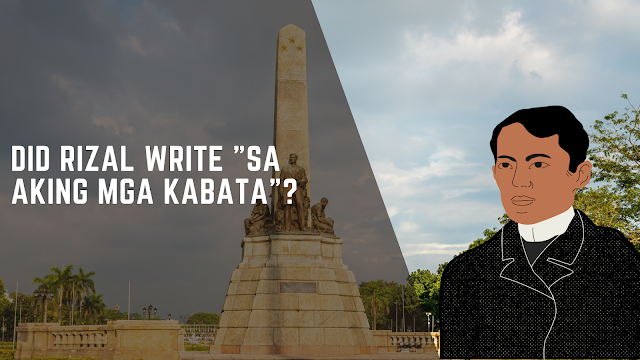It can't be denied that Jose Rizal is the most popular man in the Philippines. A national hero, his works are taught to high school students, both government and private. College students are also required to study his life as madated by RA 1425 and Circular 28 Series of 1956.
One of the poems attributed to him is titled "Sa Aking mga Kabata." Textbooks tell us that Rizal wrote the poem when he was only eight years old. The poem, originally written in Filipino, talks about love for one's own language.
An author, poet, linguist and more, researches however show that Rizal is not the author of the aforementioned poem. Ambeth Ocampo in his book, "Rizal Without an Overcoat," presented his arguments.
Ocampo notes that Rizal, just like other kids by that age, was just learning how to read. How could a young boy compare Tagalog to Latin, English, and Spanish? In an interesting metaphor, he even compared Tagalog to the "language of angels."
Another point is timeliness. The letter "k" during Rizal's childhood was not yet introduced for words then were spelled with a "c". Ironically, this change in orthography was proposed by the "mature Rizal."
Further, Ocampo notes the use of the word "kalayaan" found twice in the poem. Rizal, in a letter to Paciano in 1882, admitted that it was his first time to read the word. This happened when he was translating Schiller's Wilhelm Tell from German to Tagalog. Ocampo then asks that if Rizal, 21 by then, first encountered the word while studying in Europe, how could he have used it in writing the poem when he was eight?
Ocampo adds that no original manuscript from Rizal himself exists and he never attempted to assert his authorship while he was alive. The poem was only published a decade after his death.
In this case, then who is the "real" author of the poem? Ocampo suspects the poets Herminigildo Cruz and Gabriel Beato Francisco.
One of the poems attributed to him is titled "Sa Aking mga Kabata." Textbooks tell us that Rizal wrote the poem when he was only eight years old. The poem, originally written in Filipino, talks about love for one's own language.
An author, poet, linguist and more, researches however show that Rizal is not the author of the aforementioned poem. Ambeth Ocampo in his book, "Rizal Without an Overcoat," presented his arguments.
Ocampo notes that Rizal, just like other kids by that age, was just learning how to read. How could a young boy compare Tagalog to Latin, English, and Spanish? In an interesting metaphor, he even compared Tagalog to the "language of angels."
Another point is timeliness. The letter "k" during Rizal's childhood was not yet introduced for words then were spelled with a "c". Ironically, this change in orthography was proposed by the "mature Rizal."
Further, Ocampo notes the use of the word "kalayaan" found twice in the poem. Rizal, in a letter to Paciano in 1882, admitted that it was his first time to read the word. This happened when he was translating Schiller's Wilhelm Tell from German to Tagalog. Ocampo then asks that if Rizal, 21 by then, first encountered the word while studying in Europe, how could he have used it in writing the poem when he was eight?
Ocampo adds that no original manuscript from Rizal himself exists and he never attempted to assert his authorship while he was alive. The poem was only published a decade after his death.
In this case, then who is the "real" author of the poem? Ocampo suspects the poets Herminigildo Cruz and Gabriel Beato Francisco.

0 Comments
Post a Comment